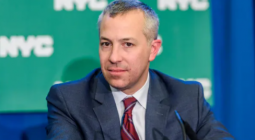Crepaldi thinks the government should learn from history. “I grew up here and one of my earliest memories is from when I was three, when soldiers were driving around telling people to leave their homes because they were expecting a flood,” he says. “Haven’t episodes like that taught us anything?”
If the sea rises we’ll have to leave’: plans to restart gas drilling threaten Italy’s sinking delta
Sixty years after fatal floods and subsidence halted gas extraction in the Po delta region, politicians are once again eyeing methane reserves. But at what cost to one of the Mediterranean’s largest wetlands and the people who live there?
To a visitor driving through Polesine in north-east Italy on a winter morning, the area might seem blessed with an abundance of wildlife. The biodiversity is among the richest in Italy, with 400 species of bird, lagoons, marshes and reed beds that have created a true natural labyrinth. Yet, it soon becomes obvious that something is not right: houses and fields are all lower than the road, visibly sunken, protected by embankments about four metres high. The reason? Without those barriers, they would be under water.
The entire area of Polesine, a strip of land between the Po delta and the Adriatic Sea, has long suffered the consequences of subsidence, but it was aggravated by gas extraction, which is why the practice was banned by the government in 1961.
Before it did so, there was Batteria – an island that no longer exists. Covering almost 300 hectares (740 acres) in the Po delta, Batteria was home to a few houses, a farm, warehouses, rice fields and lagoons for cultivating fish. But then, in 1976, a storm came in off the Adriatic Sea and Batteria was gone.
“If you want to see Batteria it’s down here, three metres under water,” says Natale Mantovan, a fisher, as he stops his boat near some semi-submerged buildings. “Twenty of us lived on the island and 1,500 worked there. Today, I pass only a few other fishermen in search of eels and mullet.”
Over the centuries, Batteria had been affected by subsidence. It is not uncommon in sedimentary soils but in Batteria’s case the process was accelerated by the extraction of methane gas, experts say.
Now, the region is under threat once again. The Italian government has reversed the ban, announcing that gas extraction will be allowed to restart. The plan is to drill new wells in the upper Adriatic, off the Polesine coast, an announcement that sparked fury and protests from residents last December.
Polesine, part of the Veneto region, is rich in methane: “We have always known that this is an area rich in gas, you just need to make a hole in a ditch and the brackish water comes out,” says Vanni Destro, a retired railway worker and member of the Polesine No Drills Committee, a group that opposes new gas extraction.
The first wells were built in 1935 and, by 1959, there were 1,424. The extraction process draws gas and salt water from the subsoil and then separates the two. The problem with taking large amounts of water from underneath the soil is that it makes the ground – that already has a tendency to sink – even more unstable, causing it to sink much faster.
In the 1950s the area experienced serious floods, including one in November 1951 that left 84 people dead and displaced almost 200,000. The Red Cross estimated at the time that 100,000 hectares (almost 250,000 acres) of land, a surface area larger than Lake Geneva, were submerged. That decade witnessed an exodus of 150,000 people from Polesine. In 1957, the seismologist Pietro Caloi, commissioned by the government to assess the causes, determined that gas extraction was to blame for “almost the entire collapse of the terrain observed in the delta”. Caloi urged the authorities to close the wells.
The government followed the advice, but it wasn’t the end of the story. The rate of subsidence simply slowed down. “It’s not enough to turn everything off, there’s a huge driving force that goes on for 30 to 40 years,” says Giancarlo Mantovani, an engineer heading the Consorzio di Bonifica, a public body that manages reclamation works in the Po delta. “Since they closed the wells we have dropped by a further two-and-a-half metres.”
If the area is still suffering from the effects of past gas extraction, it raises the question why Italy’s government has decided to resume the practice after 60 years.
The war in Ukraine has played a part. Italy used to rely on Russian gas and is trying to boost its domestic production in an effort to increase its energy security. In her 2022 inauguration speech, Italy’s prime minister Giorgia Meloni said: “Our seas have gas deposits that we have a duty to exploit.”
The proposed new wells in Polesine will be built in the sea (previously they were on land), but they are close to the coast. Offshore wells so near the coast have been demonstrated to affect subsidence in adjacent land, according to Mantovani. “A drilling station in front of Lido di Dante, near Ravenna [further south], caused the ground to sink by one-and-a-half metres,” he says.
Environmental groups strongly oppose the project. They argue that authorities are risking the environment for a minimal amount of gas. “We are talking about a total of almost 7bn cubic metres of gas – at the rate of one-and-a-half billion per year,” says Giorgio Crepaldi, another member of the No Drills Committee. It’s a fraction of Italy’s annual consumption of 70bn cubic metres. “The government just wants to show they are doing something about the rise in energy costs, but with no regard for the local populations.”
Local politicians also oppose it, including Veneto governor Luca Zaia, a key member of the rightwing League party, the main political ally of Meloni’s Brothers of Italy. Moreno Gasparini, the mayor of the small town of Loreo and president of the Veneto regional park of the Po delta, also a conservative, is another of the project’s staunch opponents. “It would be detrimental to the territory,” he says. “The whole delta is below sea level. Thanks to the barriers we can live here but if the sea rises we’ll have to leave.” Gasparini is ready to fight, he says. “Should the drilling start, we’ll block the roads.”
In 2022, the Veneto region convened a panel of experts to study the situation. They issued a report stating that there was not enough information to determine the impact the drilling would have on nearby areas and concluded that “out of caution, the activity cannot be allowed”.
One of the experts, urban planner Francesco Musco, says that subsidence is not the only risk. The Po delta, he says, is one of the largest wetland areas in the Mediterranean: “Do we want to extract or do we want to preserve?” Then, there are economic considerations: “This could jeopardise fishing and tourism, which matter a lot. Are we sure it’s the best choice?”
Yet, despite the opposition and the negative report, Italy’s central government, which has the final say, seems determined to go ahead with the extraction.
Cover photo: Sunken buildings on Batteria, an island in the Po delta, affected over decades by flooding and subsidence aggravated by methane gas drilling. Photograph: Marta Clinco and Andrea Lops/The Guardian




